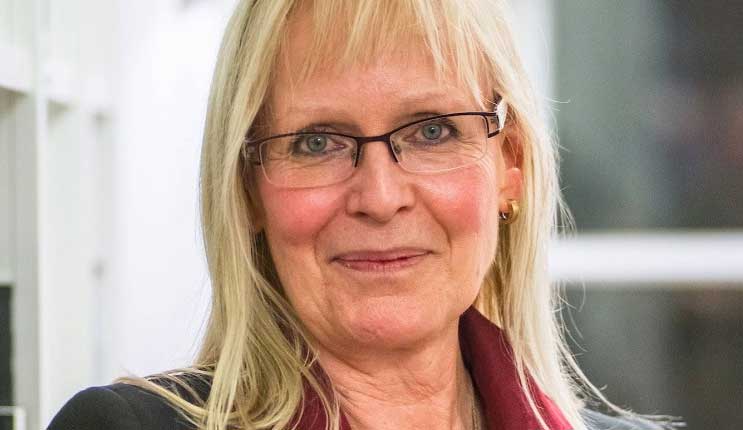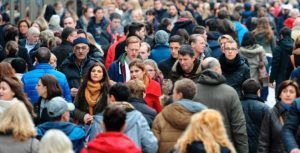Susanne Schroter is a social anthropologist teaching at Goethe University’s Institute for Ethnology in Frankfurt. She is one of the very few voices in the country to speak out about the country’s asylum policy and, more specifically, about the behavior of some male asylum seekers towards women.
Schroter is the head of a research group titled “Contemporary discourses on state and society in the Islamic world.” She also oversees another research project funded by the German Research Foundation (DFG) titled “Renegotiating gender in contemporary Indonesia: Empowerment strategies of Muslim and secular women activists.”
In an interview with the Swiss-German daily Neue Zürcher Zeitung (NZZ), Schroter speaks about the influence of Islamic centers and societies in Germany and the sharp criticism she has received from the far left.
NZZ: Mrs. Schroter, what impact has the influx of asylum-seekers had on the female population in Germany?
Susanne Schroter: They don’t feel safe in public anymore. The situation has deteriorated. Some young male refugees show complete disregard for women’s personal space. Many of these men come from patriarchal societies. They use violence to settle their disputes and even go as far as killing another person in the heat of an argument. That’s why there is so much fear in our community. The situation has to change.
Q: You’ve said in the past that liberals don’t want to speak about how male refugees view women.
A: I can’t speak about this issue without being labeled a racist. The political left is quick to criticize me, but my colleagues understand my arguments. I take special care to explain my position on these matters, but the far left takes my comment out of context. They link me to the far-right Alternative for Germany party (AfD). Their remarks generate a great deal of hatred towards me. They go to great lengths to discredit my ideas. It is frightening.

Q: You’ve said that some female Muslim refugees are demeaned by the men in their community, especially if they wear Western clothes and lead independent lives.
A: This applies to a small minority of Muslim refugees. Some men believe that they have the right to degrade and physically abuse women.
This type of behavior is legal in some refugees’ countries of origin. For instance, Indonesian women should not wear any clothing that would sexually arouse men. In many cases, victims of rape are blamed for wearing provocative clothes or not observing the strict hijab code.
This mindset is prevalent among some refugees living in Germany. The facts speak for themselves. However, denial and apathy have caused this to become a significant social phenomenon. The left completely denies that this is a growing problem, fearing that acknowledging the issue would play into the hands of the far-right groups such as AfD. Denying the facts, however, will only strengthen right-wing groups.
Q: You divide male refugees into two groups: those who successfully integrate into the community, and those who refuse to adapt to their new surroundings. You believe that men in the second group treat women like objects. This view seems a little bit extreme.
A: Many women share their experiences with me in considerable details on social media.
Q: How should women react?
A: This is the wrong question. We must instead ask what the social and political response to the situation should be. We are not there yet. We are still debating whether this problem exists or not. Refugees must abandon their native patriarchal tradition and adapt to the culture of their adopted home. They have to accept our laws and values.
Q: From the ethnological viewpoint, what are the main differences between the way Islam and Eastern Europe have impacted Western culture?
A: There are two critical issues here — namely gender and individual identity. Gender identity is a sensitive global issue. Discussions about gender identity can quickly turn into heated arguments. There is also the relationship between the individual and society. Many refugees come from non-European tribal and collective cultures.
Q: To what extent do these cultural issues hinder or help refugees to adjust to their new environment?
A: Muslim students don’t usually do well in school, which means that they won’t be able to find good jobs. What causes this situation? In some instances, religion plays a decisive role. Islamic fundamentalism is used to turn some impressionable young people against our culture.
Islamic identity exists in Germany and is growing in parallel to the far-right movement. Muslim identity opposes the assimilation of refugees into the host culture and urges them to isolate themselves from the rest of the society. But the majority of the community in Germany is culturally Muslim. They consider religion a private matter.
Q: Some Muslim immigrants try to expand their sphere of influence.
A: Particularly some of those who belong to Islamic centers, societies, and organizations. They are demanding certain rights. For them religion is paramount. These exclusive rights start with teachers wearing headscarves, building prayer rooms in universities and not administering or taking exams during the holy month of Ramadan. They cite the growing Muslim population in Germany as the reason for their demands.
Q: The majority of male refugees are under 30 years old. Some people highlight cultural differences as the underlying cause of discontent, but also argue that young men are volatile and prone to violence.
A: Youth and culture are contributing factors. It is true that young men are more likely to resort to violence. Once here, many young male refugees find it difficult to adjust to their new environment, get jobs or find girlfriends. Their anger and frustration boil over, leading to aggression and violence, which naturally places pressure on both the immigrant community and the German society.
As I mentioned before, only a small minority of refugees commit violent acts, but their actions have a massive impact on our society. There have been instances of girls and women being sexually assaulted by a group of young male refugees at swimming pools and public events. We have never experienced anything like this before.
Q: How should the government and the public deal with these types of refugees?
A: We have to control them. We must reform the current system of educating new immigrants to facilitate their integration into the German society. We must penalize anyone who fails or refuses to attend orientation and cultural awareness classes designed to help refugees to adjust to their new home. The authorities should deport immigrants who have been convicted of crimes and who are least likely to become responsible citizens to the countries of their origin. An incident such as the murder of a 14-year-old girl (by a 20-year-old Iraqi asylum-seeker) in Mainz, western Germany, could fuel anti-immigration sentiments. A few bad apples could ruin the situation for the rest of the immigrant community.
[Translated from Persian by Fardine Hamidi]


